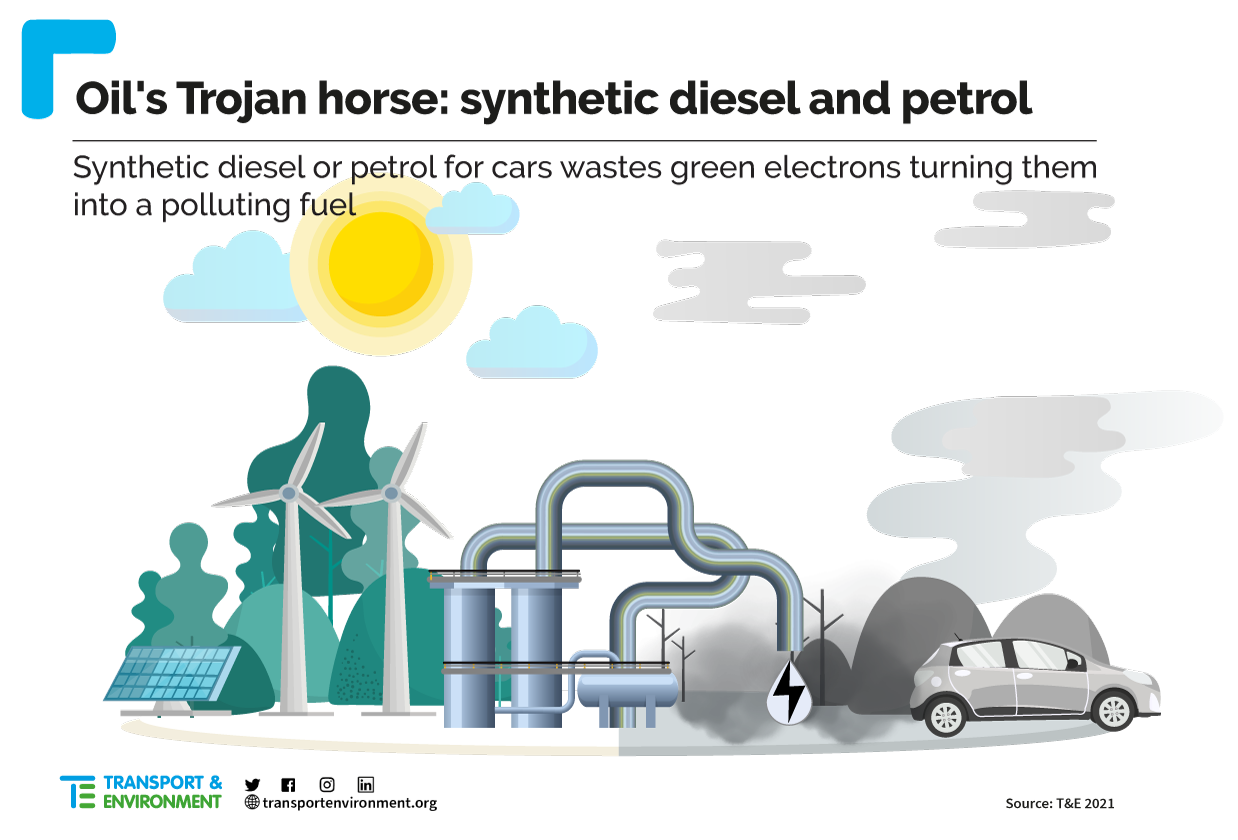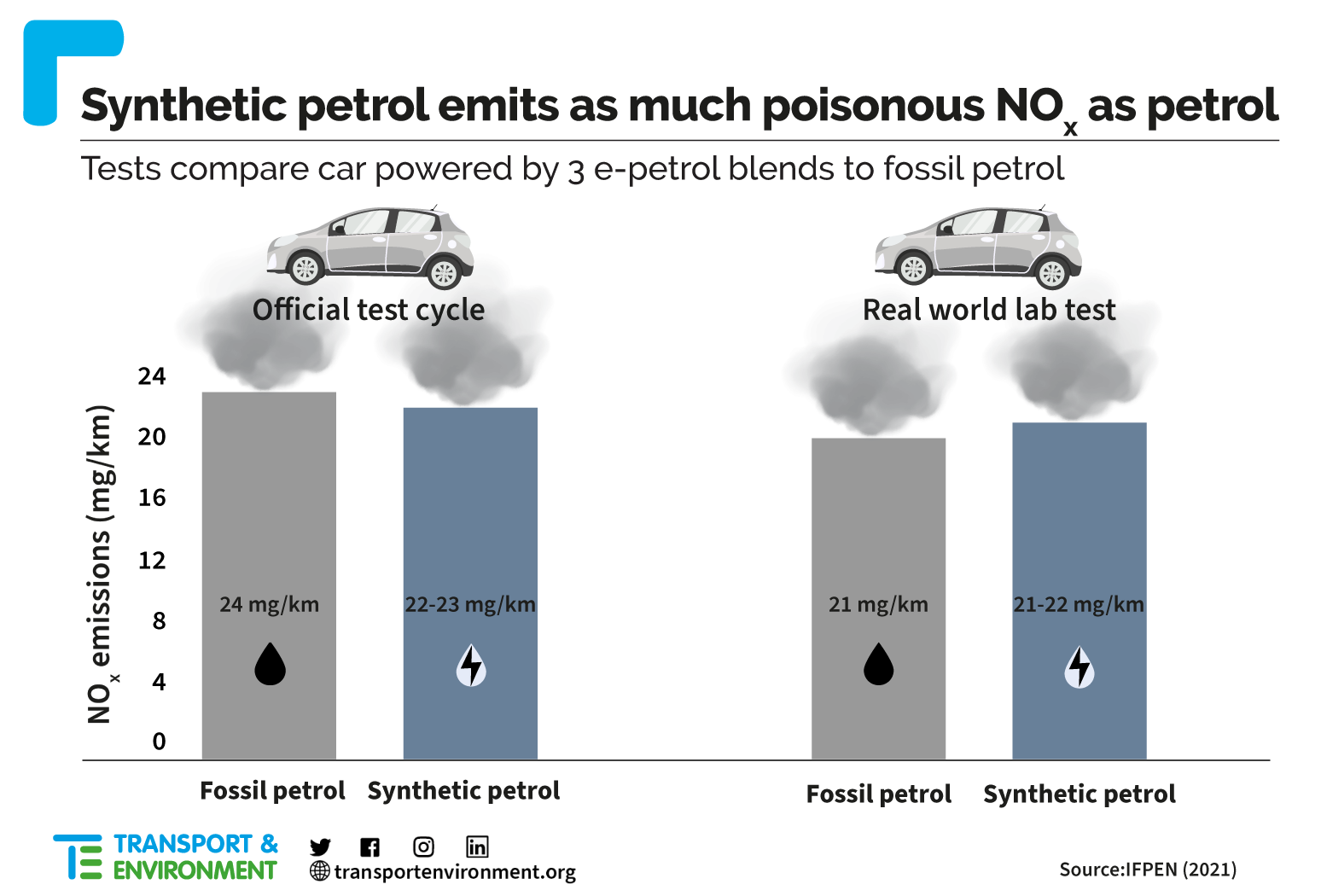Plug-in cars are in the midst of a boom, accounting for almost every fifth car bought across the EU in 2021. As their sales soar and performance improves, more and more carmakers are now committing to go 100% electric from 2030 onwards. But despite the most optimal zero emission technology to decarbonise cars – batteries – now clear, some in the oil and automotive industry including Bosch, Porsche and Europe’s oil lobby FuelsEurope are pushing for synthetic petrol and diesel, or “e(lectro)” fuels instead.
E-fuels are made by an expensive process which turns electricity into hydrogen, which in turn is combined with CO2 to produce liquid fuel that can be similar to petrol or diesel used in conventional engines (as well as kerosene used in aviation). Its proponents claim that if renewable electricity is used and CO2 is captured from the air, then the e-petrol and e-diesel are climate neutral fuels that will also reduce pollution. So the argument goes: instead of decarbonising engines, why don’t we decarbonise the fuel itself.

T&E decided to put these clean fuel claims to test and commissioned IFP Energies Nouvelles to run a series of lab based tests simulating real-world driving (WLTC and RDE) to measure the emissions of different e-petrol blends in an A-class (A180) Mercedes.
Despite much publicity from some auto suppliers and the oil industry, the e-petrol to perform the tests could not be purchased due to lack of commercial production, IFPEN had to blend three e-fuel blends representative of potential future fuel that are compatible with petrol cars. Two different 100% e-petrol blends and one blending 2nd generation ethanol (10%) and e-fuel were made. The emissions were compared to the standard E10 EU petrol.
The results of pollutant emissions show that:
- No difference in NOx emissions were observed for any of the e-fuels tested either on the lab or on road tests compared to today’s petrol fuel. This means that e-fuels emit the same amount of NOx pollution as fossil fuels today, so the use of e-petrol in cars will have little impact on NOx emissions which are at the heart of toxic NO2 pollution across Europe’s cities.

- A substantial decrease in particle emissions was observed on all tests. The number of particle emissions (PN) larger than 10 nm decreased by 97% on the lab test, and by 81-86% on the RDE test cycle. While this was a significant improvement compared to the fossil fuel tested – and is many times below the legal limit – the very large number of particles emitted out of the exhaust in the first place meant that particle pollution was far from eliminated. Even with the use of 100% e-petrol blends, at least 2.2 billion particles were still released for every kilometer driven. There was no difference observed in particle mass (PM) emissions.
- Toxic carbon monoxide emissions were much higher with the e-petrol blends tested. Emissions were up to almost 3 times higher on the lab WLTC test and 1.2-1.5 times higher on the RDE test compared to fossil fuel. The largest increase in emissions occurred when the engine was first switched on, which happens often in towns and cities.
- Hydrocarbon emissions, i.e harmful chemical compounds made of hydrogen and carbon, decreased by 23-40% on the WLTC test but no difference was observed on the RDE test due to low emissions for all fuels. Emissions of dangerous but not yet regulated aldehydes – acetaldehyde and formaldehyde – decreased with the use of e-fuels when the engine was first switched on, but no significant difference was seen on the test overall.
- Ammonia emissions of two e-petrol blends roughly doubled on the RDE test, with emissions particularly increasing after the engine is first switched on (cold start) which frequently occurs in towns and cities. These results indicate that some e-petrol blends may cause an increase in ammonia emissions which is a precursor to PM2.5 pollution.
Overall, the testing shows that e-petrol is not a clean fuel and, beyond particles, will do little to reduce toxic pollutant emissions of both regulated and unregulated pollutants compared to petrol fuel used today. To find out more, download the full report and test results.
UPDATE: In response to the e-fuels testing, fossil fuel industry lobby group FuelsEurope accused T&E of cherry-picking the results, but here we debunk each of their points.


